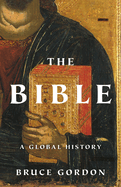
The Bible by Bruce Gordon is not only a well-researched and thorough history of the Bible around the world but also a gripping account of literacy, bookmaking, and power. With an engaging conversational tone and a clear command of history, Gordon traces the Bible from its beginnings as a codex. He discusses the "two great surviving codices" of the fourth and fifth centuries and includes tantalizing asides, such as Napoleon Bonaparte's removal of one of those codices to Paris after he conquered Italy, and explains how the Bible's disparate parts continue to come together.
Gordon, a professor at Yale Divinity School, does an impressive job of respecting the faithful while laying bare the conflicts that arose around biblical interpretations, such as making war or permitting slavery. He provides examples of the powerful withholding text from congregations so clergy could retain exclusive interpretations, but also cites figures such as Samson Occom, author of the first printed book by a Native American, who quoted from the Bible to oppose "colonial oppression of Indigenous peoples"; and Frederick Douglass, who learned to read using the Bible, like many enslaved people, and highlighted the hypocrisy of Christians who held slaves. Gordon also discusses the Bible's influence on the music of Bach, Handel, and spirituals; the art of Rembrandt and Caravaggio; works by Chaucer, Milton, and C.S. Lewis.
Gordon seamlessly moves between the global stage (the tension between science and faith during the Renaissance, the rise of Puritanism) and specific individuals whose faith was nourished by their newfound access to the Bible. Whether zooming out or zeroing in, Gordon guides readers on a journey of a text he proves is still evolving. --Jennifer M. Brown

